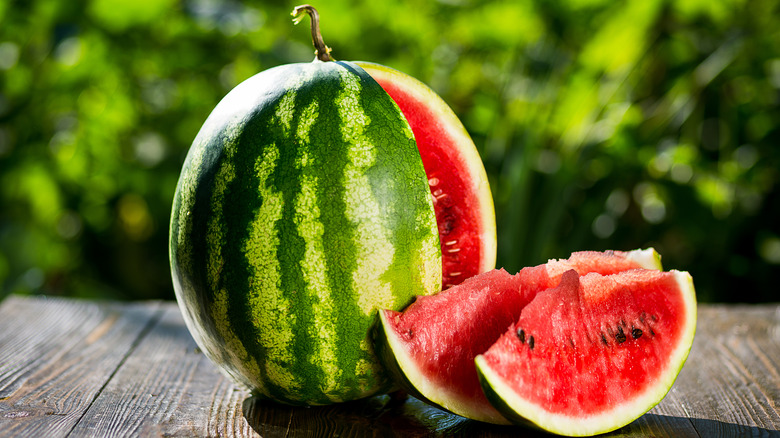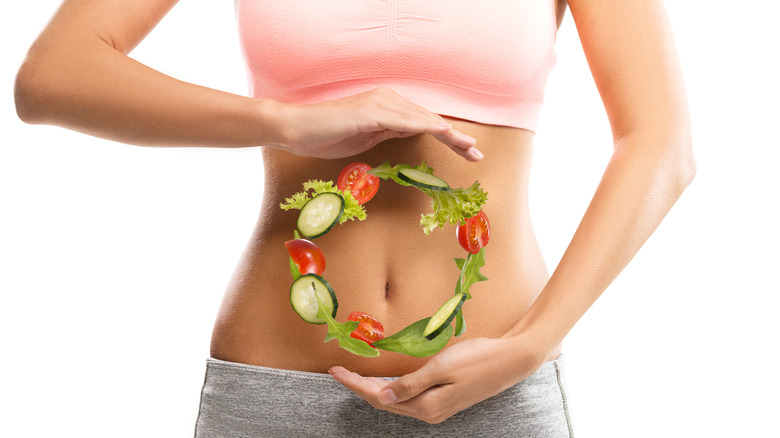When You Eat Watermelon Seeds, This Is What Happens To Your Body
Do you ever eat watermelon seeds or just throw them away? As it turns out, watermelon seeds are a powerhouse of nutrition. One cup delivers more than 30 grams of protein and just 16 grams of carbs, according to My Food Data. It also provides large doses of magnesium, potassium, zinc, and B-complex vitamins.
Rich in protein and low in calories, watermelon seeds can be a healthy addition to most diets. Enjoy them roasted or sprouted as an afternoon snack, toss them in salads, and sprinkle them over oatmeal or chia pudding. The Spruce Eats, for instance, recommends rinsing the seeds and then spreading them on a cookie sheet. Let them dry and roast them on the stove or in the oven.
This crispy snack can suppress appetite and keep you full longer due to its high protein content. Protein, one of the most abundant nutrients in watermelon seeds, increases satiety and keeps your metabolism up, per a 2012 review in the British Journal of Nutrition. Over time, it may improve blood pressure and body composition, or fat-to-muscle ratio.
Watermelon seeds can boost heart health
Contrary to popular belief, watermelon seeds won't grow in your belly. If you eat them raw, they'll pass through intact, says registered dietician Keri Gans (via Prevention). Sprout or roast the seeds so that your body can digest and metabolize their nutrients.
Speaking of nutrients, 1 ounce of watermelon seeds provides 35% of the daily recommended magnesium intake (per My Food Data). This mineral regulates about 300 enzymatic reactions in the body, according to a 2018 editorial published in Open Heart. As the researchers note, magnesium supports cardiovascular function and overall health. A diet low in this nutrient may cause irregular heartbeat, heart failure, and sudden cardiac death.
Magnesium also plays a key role in energy metabolism. Simply put, it helps your body break down and process glucose, lipids, and protein. Considering these aspects, it's not surprising that low magnesium levels may contribute to atherosclerosis, diabetes, and other cardiometabolic ailments. Moreover, magnesium deficiency can increase oxidative stress and lead to myocardial injury (via Open Heart).
Eat watermelon seeds for better digestion
As you probably know, dietary fiber keeps you regular and supports digestive function. It also increases satiety while reducing cholesterol and blood sugar levels, per the Mayo Clinic. Moreover, high-fiber diets have been linked to a lower risk of diabetes, hemorrhoids, heart disease, and cancer. Watermelon seeds provide over 39 grams of fiber per 3.5 ounces, according to a 2016 review published in the International Journal of Nutrition and Food Sciences. Therefore, the seeds may aid in digestion and fill you up quickly, making it easier to cut calories. Just make sure you don't go overboard.
"There is a good deal of insoluble fiber in the seeds, which can cause your digestive system to slow down if there is not enough water and other material to continue to push it through," nutritionist Gina Keatley told Prevention. Simply, watermelon seeds may cause constipation if consumed in excess or without enough water. Other potential side effects are gas and bloating, warns registered dietician Jessica Cording (via Prevention).
The Mayo Clinic recommends about 25 grams of fiber per day for women under the age of 50 and 38 grams per day for men age 50 or younger. If you're a woman over 51 years old, try not to exceed 21 grams of fiber per day. Men in this age group should aim for approximately 30 grams of fiber per day. Start with a small amount of watermelon seeds and increase it gradually to prevent bloating and constipation.
Achieve healthier skin
Watermelon seeds may also improve skin health due to their high content of vitamins, minerals, and antioxidants. Folate, for example, protects your skin and tissues from oxidative stress and increases cell turnover, according to Tri-City Medical Center. Thiamin, one of the most abundant B-complex vitamins in watermelon seeds, promotes wound healing. Riboflavin, on the other hand, may prevent dryness and decrease inflammation, reports the same source.
Just 1 ounce of watermelon seeds offers 26% of the recommended daily zinc intake (per My Food Data). This mineral may help prevent and reduce acne, eczema, rosacea, and other skin disorders, according to Healthline. Researchers attribute these potential benefits to its antimicrobial and anti-inflammatory effects.
In clinical trials, zinc has been proven effective against warts, psoriasis, and pigmentary disorders, notes a 2014 review in Dermatology Research and Practice. This nutrient plays a key role in tissue repair and modulates various inflammatory cytokines. Given these benefits, it might be worth swapping your go-to snacks for a handful of watermelon seeds. They're just as healthy as they are delicious.



